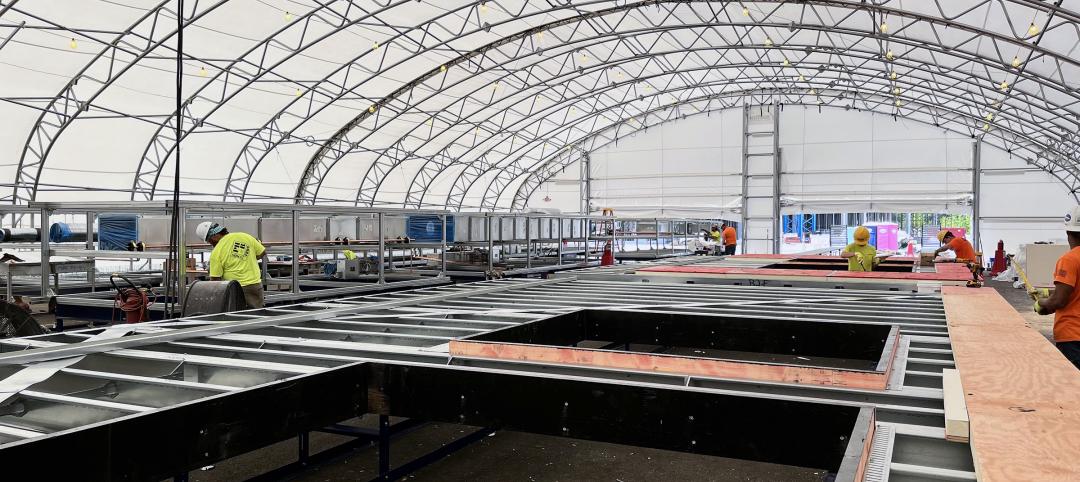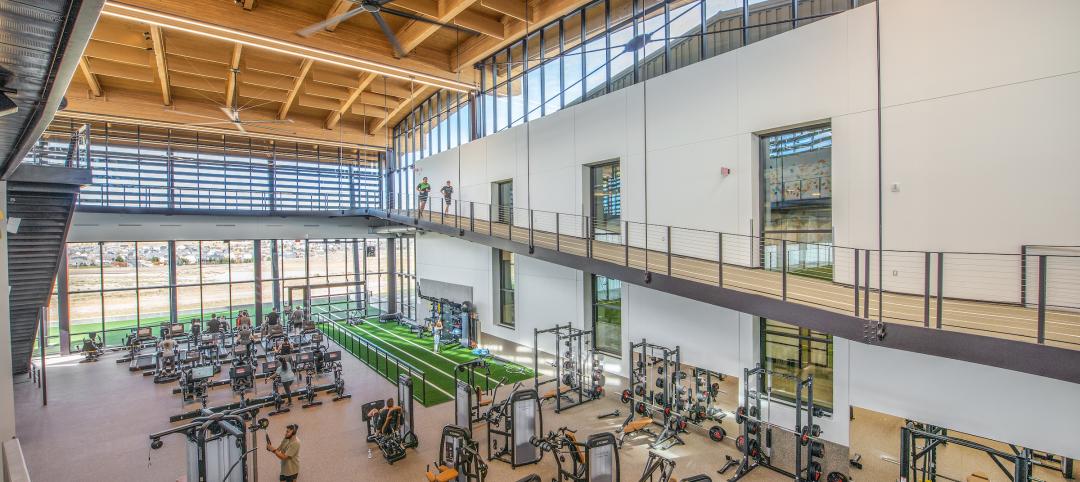The University at Buffalo (UB) has unveiled HOK's dramatic design for its new School of Medicine and Biomedical Sciences building on the Buffalo Niagara Medical Campus.
The seven-story medical school will bring 2,000 UB faculty, staff and students daily to downtown Buffalo and, at more than 500,000-square-feet, will be one of the largest buildings constructed in Buffalo in decades. HOK’s design features two L-shaped structures linked to create a six-story, light-filled glass atrium that includes connecting bridges and a stairway. Serving as the building’s main interior “avenue,” the atrium will be naturally illuminated by skylights and two glass walls, one along Washington Street and one at the terminus of Allen Street.
The building, which HOK is designing for LEED Gold certification, will have a facade clad with a high-performance terra-cotta rain-screen and a glass curtain wall system that brings daylight deep inside.
Incorporating the NFTA Allen Street transit hub into the medical school’s ground floor provides convenient mass transit access, furthering the development of a sustainable, vibrant community.
The new medical school will help the university achieve objectives critical to the UB 2020 strategic plan: creation of a world-class medical school, recruitment of outstanding faculty-physicians to the university and transformation of the region into a major destination for innovative medical care and research.
“The new design allows us to grow our class size from 140 to 180, educating more physicians, many of whom will practice in the region,” said Michael E. Cain, MD, vice president for health sciences at UB and dean of the medical school. “It allows UB to hire more talented faculty, bringing to this community much-needed clinical services and medical training programs.”
“HOK’s design for UB’s medical school creates the heart for the new Buffalo Niagara Medical Campus while integrating and connecting to the surrounding communities," said Kenneth Drucker, FAIA, design principal for the project and design director for HOK’s New York office. "The building’s atrium will be the focal point for bringing together clinical, basic sciences and educational uses fostering collaboration.”
The building’s first two floors will house multipurpose educational and community spaces for medical school and community outreach programs.
A second-floor bridge will link to the new John R. Oishei Children’s Hospital and the Conventus medical office building under construction along High Street adjacent to UB’s new medical school.
The third, fourth and fifth floors of the medical school will feature core research facilities and approximately 150,000 square feet of state-of-the art research laboratories.
“The new lab spaces will allow us to efficiently group faculty by thematic research areas," said Cain. "Because they are modular, we can change their size and configuration as needed."
The sixth floor will house some of the country's most advanced specialized medical education facilities, including an expanded patient care simulation center that will feature the Behling Simulation Center currently located on UB’s South Campus. It also will house a surgical simulation center where medical students can conduct surgeries in a simulated operating room. A robotic surgery simulation center will train students and physicians in remote control surgery technologies.
The medical school’s administrative offices and academic departments will be located on floors three through seven. The seventh floor will house gross anatomy facilities.
“From the new school’s active learning environments to the highly flexible research laboratories supporting multidisciplinary teams of investigators, the design supports a range of global trends for the design of academic and research facilities,” said Bill Odell, FAIA, HOK’s director of science and technology.
"The building layout brings together academia and research to foster collaboration and interdisciplinary patient care,” added Jim Berge, AIA, principal-in-charge for the project and HOK’s director of science and technology in New York. “There will be many opportunities for students, faculty, researchers, administrators and members of the local medical community to interact.”
The $375 million medical school is funded in part by NYSUNY 2020 legislation. Groundbreaking is scheduled for September 2013 and construction is expected to be complete in 2016.
HOK’s Science +Technology group has designed medical schools and research laboratories for Florida State University, the University of Alberta, Washington University in St. Louis and The Commonwealth Medical College in Scranton, Pa. The firm served as lead designer for The Francis Crick Institute's cardiovascular and cancer research center in central London and won an international competition to design the Ri.MED Biomedical Research and Biotechnology Center in Palermo, Sicily.
HOK is a global design, architecture, engineering and planning firm. Through a network of 24 offices worldwide, HOK provides design excellence and innovation to create places that enrich people's lives and help clients succeed. In 2012, for the third consecutive year, DesignIntelligence ranked HOK as the #1 role model for sustainable and high-performance design.
Related Stories
Project + Process Innovation | Mar 22, 2023
Onsite prefabrication for healthcare construction: It's more than a process, it's a partnership
Prefabrication can help project teams navigate an uncertain market. GBBN's Mickey LeRoy, AIA, ACHA, LEED AP, explains the difference between onsite and offsite prefabrication methods for healthcare construction projects.
Women in Design+Construction | Mar 21, 2023
Two leading women in construction events unite in 2023
The new Women in Residential + Commercial Construction Conference (WIR+CC) will take place in Nashville, Tenn., October 25-27, 2023. Combining these two long-standing events aligns with our mission to create an event most impactful for women in the $1.4 trillion U.S. commercial and residential design and construction industry.
Mass Timber | Mar 19, 2023
A 100% mass timber construction project is under way in North Carolina
An office building 100% made from mass timber has started construction within the Live Oak Bank campus in Wilmington, N.C. The 67,000-sf structure, a joint building venture between the GCs Swinerton and Wilmington-headquartered Monteith Construction, is scheduled for completion in early 2024.
Sports and Recreational Facilities | Mar 17, 2023
Aurora, Colo., recreation center features city’s first indoor field house, unobstructed views of the Rocky Mountains
In January, design firm Populous and the City of Aurora, Colo. marked the opening of the Southeast Aurora Recreation Center and Fieldhouse. The 77,000-sf facility draws design inspiration from the nearby Rocky Mountains. With natural Douglas Fir structure and decking, the building aims to mimic the geography of a canyon.
Architects | Mar 16, 2023
HKS launches partner diversity program to create a more diverse workforce and partnership network
Design firm HKS has launched a new partner diversity program that will work to build a more diverse AEC ecosystem. The HKS xBE program will give xBE firms (a term encompassing all disadvantaged businesses) and their members “access to opportunities to build relationships, pursue new work, and bolster innovation within the architecture and design professions,” according to HKS.
Sustainability | Mar 16, 2023
Lack of standards for carbon accounting hamper emissions reduction
A lack of universally accepted standards for collecting, managing, and storing greenhouse gas emissions data (i.e., carbon accounting) is holding back carbon reduction efforts, according to an essay published by the Rocky Mountain Institute.
Sports and Recreational Facilities | Mar 15, 2023
Georgia State University Convocation Center revitalizes long-neglected Atlanta neighborhood
Georgia State University’s new Convocation Center doubles the arena it replaces and is expected to give a shot in the arm to a long-neglected Atlanta neighborhood. The new 200,000 sf multi-use venue in the Summerhill area of Atlanta is the new home for the university’s men’s and women’s basketball teams and will also be used for large-scale academic and community events.
Sponsored | Cladding and Facade Systems | Mar 15, 2023
Metal cladding trends and innovations
Metal cladding is on a growth trajectory globally. This is reflected in rising demand for rainscreen cladding and architectural metal coatings. This course covers the latest trends and innovations in the metal cladding market.
Education Facilities | Mar 15, 2023
DLR Group’s Campus Planning Studio defines new leadership
Linsey Graff named Campus Planning Leader. Krisan Osterby transitions to Senior Planner.
Building Tech | Mar 14, 2023
Reaping the benefits of offsite construction, with ICC's Ryan Colker
Ryan Colker, VP of Innovation at the International Code Council, discusses how municipal regulations and inspections are keeping up with the expansion of off-site manufacturing for commercial construction. Colker speaks with BD+C's John Caulfield.




















